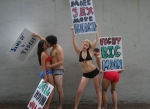Claiming hate a good thing and a motivating factor in improving something, Honda UK has launched a website and accompanying video explaining how hate can lead to change - in this case, diesel engines. Using this logic, Honda illustrates how it has taken the lowly diesel engine and made it into a beautiful, desirable thing. This is the kind of video you want to watch while on drugs - not that we advocate that sort of thing.
It seems most parents are OK with their kids seeing nipples. In a study conducted by the Kaiser Family Foundation called Parents, Media and Public Policy, only 17 percent of parents surveyed were "very concerned" about the baring of Janet Jackson's nipple at this year's Super Bowl. In fact, 53 percent were "not at all concerned." While nipples may be OK, 63 percent of parents were "very concerned" that their children see too much inappropriate content in entertainment and media. Until the media realize they don't have to shoot for the lowest common denominator just to get a rating point and that consumers might actually enjoy quality programming, there is sure to be a continuous supply of slutted up TV.
During this week's MediaPost Forecast 2005, Yankelovich Partners President J. Walker Smith and others on a panel at MediaPost's Forecast 2005 conference this week at the Marriott Marquis in New York said it may be time to pay consumers to watch commercials. While it's not a new idea, perhaps they read a previous Adrants article which proposed a radical new economic model for advertising. OK, radical for TV. Not so radical for online media.
Based on the inevitable shift from the measurement of programming to the measurement of the ads within those programs, all effort will be shifted from promoting programming to promoting ads within those programs. When all eyes are on the ad ratings versus program ratings, it will be incumbent upon networks to prove they have the highest "ad viewership" rating. Because of this driver, it will be the networks, not the advertisers, who will pay consumers to view. Oh, the advertisers will continue to pay much in the same way they do today but they'll be paying based on ad viewership ratings and not programming ratings. Conceivably, all the program promotion we now see from the networks will be replaced by promotions for upcoming commercials consumers "must see." Crazy? Sure. Likely? Very definitely. The money is in the consumer eyeball and marketers will be forced to do what is necessary to reach those eyeballs whether it's wild models such as this or more refined permission marketing-based models.
A study released yesterday by Dynamic Logic which analyzes how the three media work together found magazines, when combined with TV and online, more than doubled magazine reader's purchase intent. Ad size and high involvement were cited as reasons for the medium's high scores.
In Defense of Animals, a California-based anti-fur group, has launched a new ad campaign created by Peter Max. Max has painted five presidents, the Beatles, Aerosmith and the Rolling Stones. We assume he knows what he's doing although, looking at the ad, one wonders if Max just stepped out of middle school art class.
The campaign features images of puppies and kittens alongside foxes and beavers with tear-jerk copy that reads, "Make respect for all life your fashion statement. Beavers and foxes have as much right to live as cats and dogs. Please don't wear fur." Ads have appeared in local West Coast print and plans are in place for the campaign to appear nationally.
A Binghampton Binghamton, New York CVS has been distributing a cash register coupon which offers $4 off "on any stomach purchase of $15 or more."
Apparently in a hurry to boost sales of stomach remedies, someone was too quick at the keyboard on this one.
B.L. Ochman points to Votergasm, a group that encourages young Americans to vote, has launched a website where citizens can pledge to have sex with or withhold sex from their partners based on there voting plans. Vote and you get sex. Don't and you don't. The group seeks to get 100,000 first time voters to the polls and to "catalyze 250,000 orgasms by the morning of November 3."
If we do our math correctly, there's a few multiple orgasms in there.
Or at least multiple partner action going on. All good.
According the website, "Votergasm is a non-partisan nonprofit campaign formed to simultaneously reverse two disturbing trends in American society: low voting rates among young people, and unacceptably low rates of youth sexual activity. The focus of Votergasm.org is to encourage young people everywhere to pledge to have sex with voters on Election Night, and withhold sex from non-voters until the next presidential election."

We have absolutely no problem with that approach. More orgasms are great for reducing stress and political correctness desease. Be sure to check out the collection of hilarious pictorials ("Letters to members of Congress, Dawn reflects, are like skirts: they get the most attention if they're short, tight, and clear" and "Rod and Mercedes love to have sex on the beach--but, because of the tides, the beach keeps moving! High tide, low tide, high tide... it drives them crazy. They want change. They've written to Congress, but have had no luck. To stop the tides, it seems, they'll have to form an advocacy group.") mixing sex with tongue in cheek political interests. Brilliant.
The National Rifle Association has plans to launch a $1 million, 1,000 newspaper buy claiming undecided voters are newspaper readers. In typical NRA, gun-loving language, NRA Director of Public Affairs Andrew Arulanandam said, "You go hunting where the ducks are."
As marketers continue to seek access to the ever cooler, increasingly elusive consumer, many are turning to cultural insiders like Steve Stoute, a former record exec who now enables marketers to enter consumer realms previously off limits. Stoute puts on events and links marketers to subculture most marketers never knew existed. He's currently helping Hewlett Packard and arranged a post MTV Music Awards party hosted by Sean Combs that involved plenty of liquor and plenty of HP products laying around for party-goers to check out. He's also helped Reebok as well as hooking McDonald's up with Justin Timberlake to create the "I'm lovin' it" theme. Basically, he helps covert marketer's perception of their cool factor into actual cool factor.






